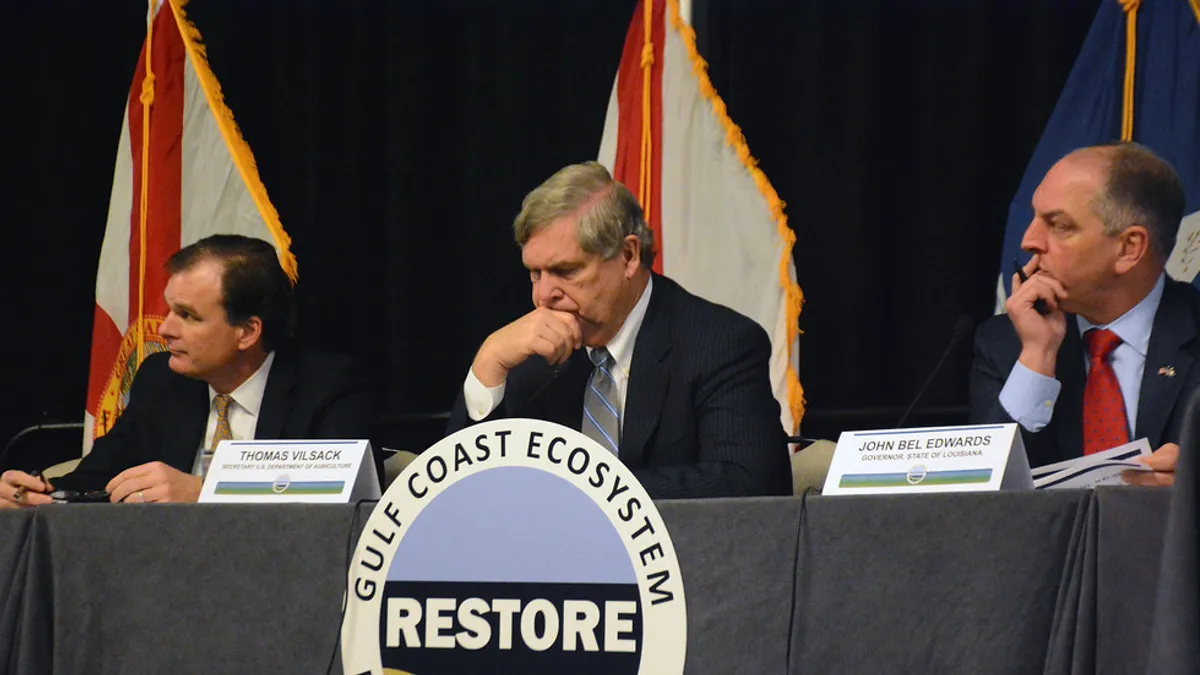Dive Brief:
- In an Aug. 19 executive order, Louisiana Gov. John Bel Edwards, D, set his state on a path toward net-zero carbon emissions by 2050.
- His order establishes a task force charged with reaching that goal, and in the interim reducing economy-wide emissions 26-28% by 2025 and 40-50% by 2030.
- The new goals and task force will likely "supercharge" an energy transformation that is already underway in Louisiana, potentially reducing the cost of electricity in regional markets, according to Simon Mahan, executive director of the Southern Renewable Energy Association.
Dive Insight:
The Climate Initiatives Task Force executive order could have implications not only for that state's local utilities and economy, but also for consumers and companies throughout the region, according to clean energy advocates.
A second executive order was signed the same day, intended to improve the state's response to climate change under the leadership of a new Chief Resilience Officer. According to the governor's office, both initiatives are intended build on the state's efforts to address sea level rise.
"With our Coastal Master Plan, Louisiana has led the nation in adapting to environmental change," Chip Kline, the governor's executive assistant for coastal activities, said in a statement. "It is time we take a more proactive stance on one of the largest drivers of that change: greenhouse gas emissions."
To that end, the executive order charges the new Climate Initiatives Task Force with using science to "develop strategies for curtailing Louisiana's greenhouse gas emissions in a manner that fully recognizes the state's extreme climate vulnerabilities as well as the characteristics of its energy-intensive economy," according to the governor's announcement. It recognizes that Louisiana faces unique challenges and opportunities — including the industry-heavy nature of its emissions profile and economy, and its potential to make use of carbon capture and storage — and directs the task force to come up with a plan to achieve net zero emissions by 2050.
That long-range vision, according to Mahan, stands to change the course of Louisiana's economy and alter the way electricity is generated in the region.
"Louisiana is at the crossroads of the energy industries," he said. "With significant economic declines in the oil and gas sector, having a transition to solar, wind and other renewable resources is going to be important for Louisiana to create new jobs and retain the skilled workforce they have already."
The state also has a role to play in changing the way electricity is generated regionally, with ties to several critical regional transmission organizations, Mahan said. Enabling more low-cost renewable generation to take root in Louisiana could reduce the cost of electrical generation across the region if some of the older power plants that currently exist in the state are replaced as a result of the state's climate policies.
Low-cost renewable resources are already out-competing these older plants, Mahan said, but the creation of the task force and the policies it may recommend could "take what's already happening in the state and put a supercharger on it."
To make that happen, Mahan said, the governor and the newly created task force will need to focus on maximizing stakeholder involvement to combat the adherence to "outdated information" that he said has held Louisiana back.
"I tend to find that people want the best available information," Mahan said, "but if there's not a way for folks to contribute, that makes it hard."
So far, he added, the new climate initiative seems off to a good start, with the governor recommending a "really hefty list" of experts and stakeholders to be included on the task force.
Louisiana-based electric generator Entergy expressed a similar sense of optimism about the makeup and direction of the new task force, and issued a statement applauding the state's 2050 emissions target.
"We think the Governor's approach is a fair and balanced way to bring consumers and energy stakeholders together to explore workable solutions for transitioning to a lower-carbon economy," the company's statement reads.














